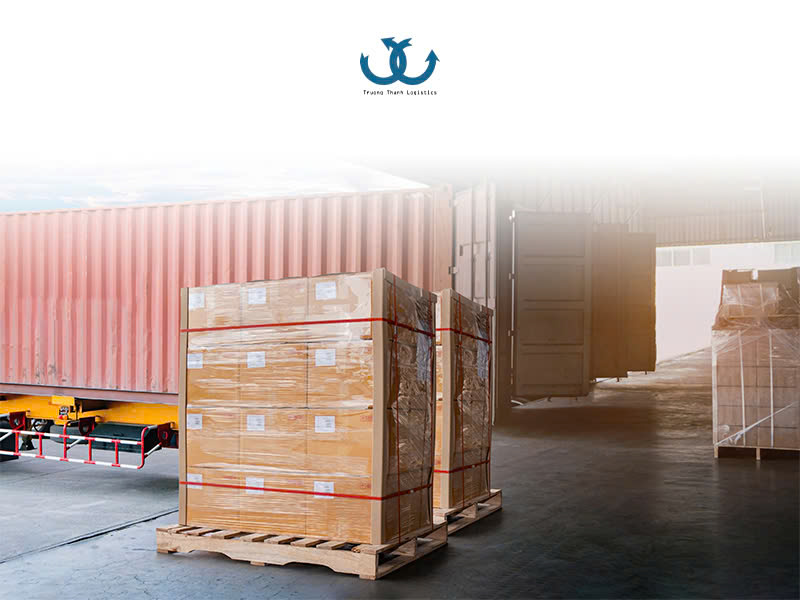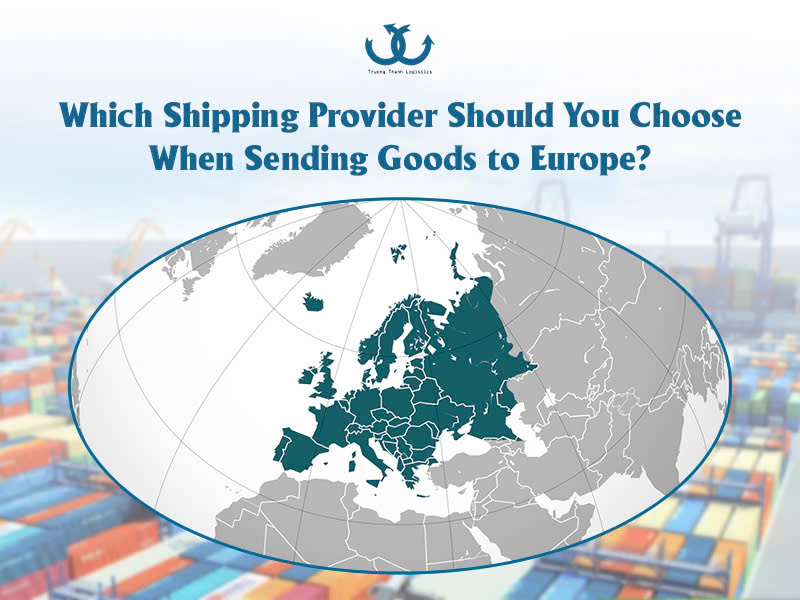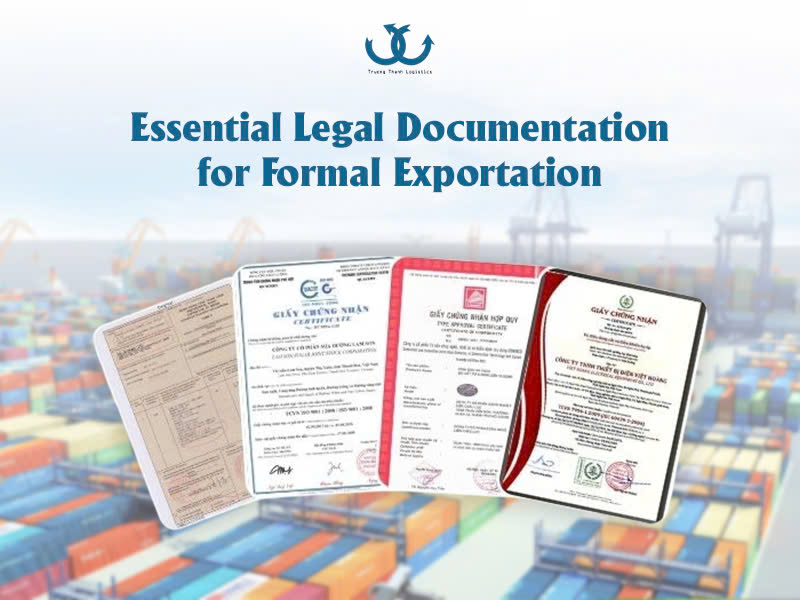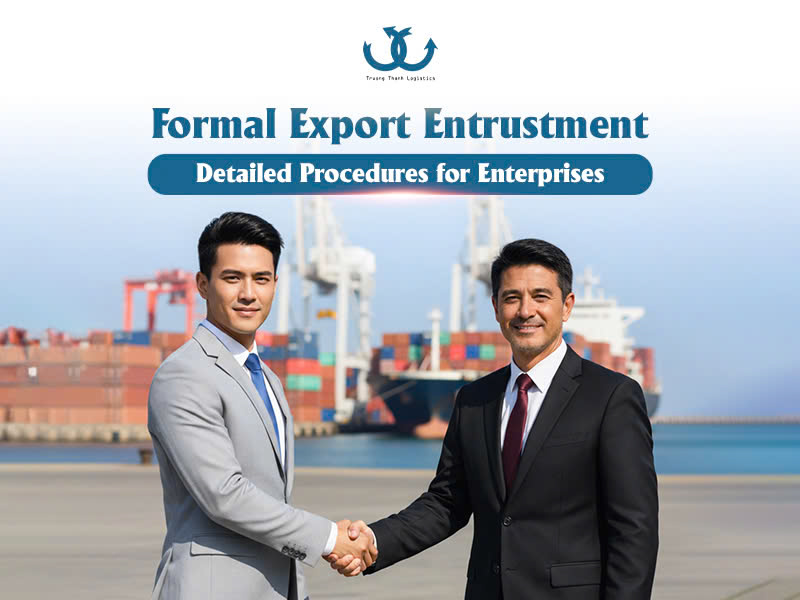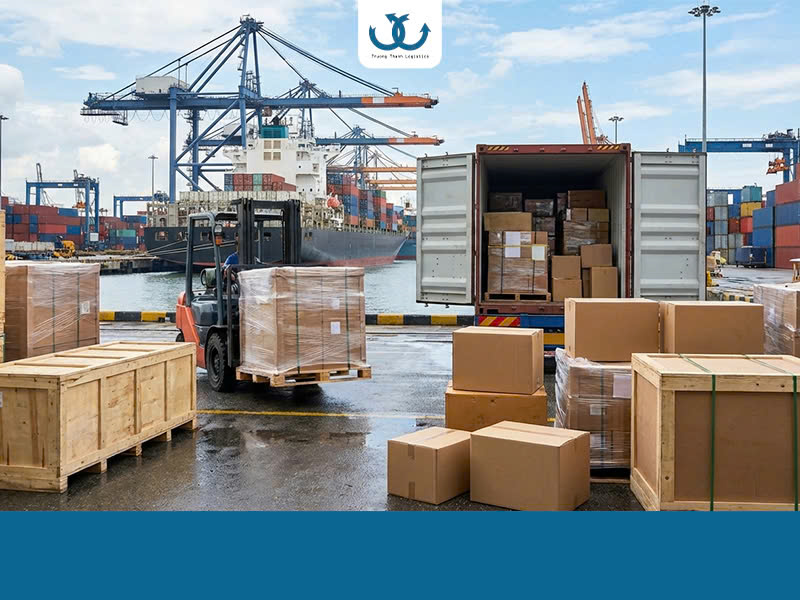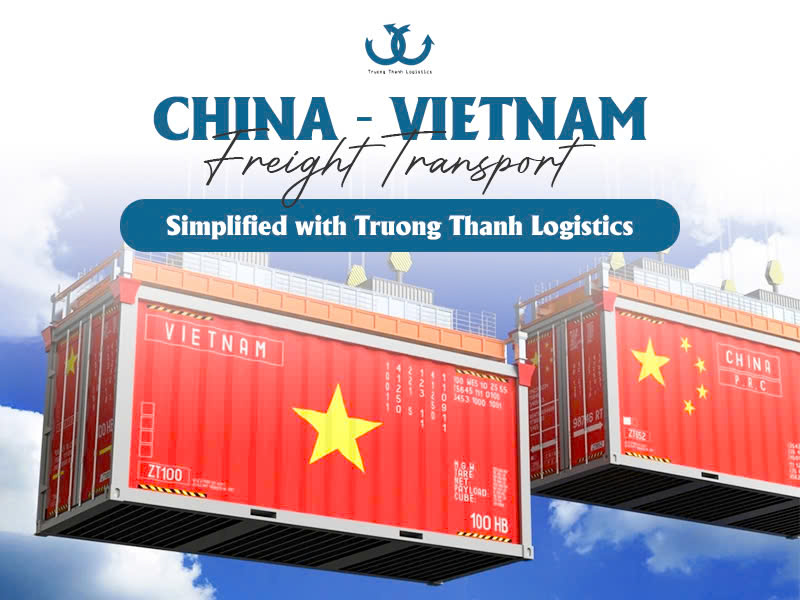International cargo insurance helps businesses minimize risks during cross-border transportation. Explore the benefits, coverage, and purchasing process of international cargo insurance with Trường Thành Logistics.
1. What is International Cargo Insurance?
International Cargo Insurance provides financial protection for goods transported across countries by sea, air, land, or multimodal transport.
When risks such as loss, damage, fire, explosion, ship sinking (in maritime transport), natural disasters, or transport accidents occur, the insurance company will compensate part or all of the cargo value according to the policy terms.
In today’s dynamic global trade environment, cargo insurance is not only a benefit but also a critical obligation that protects both goods flow and business profits.
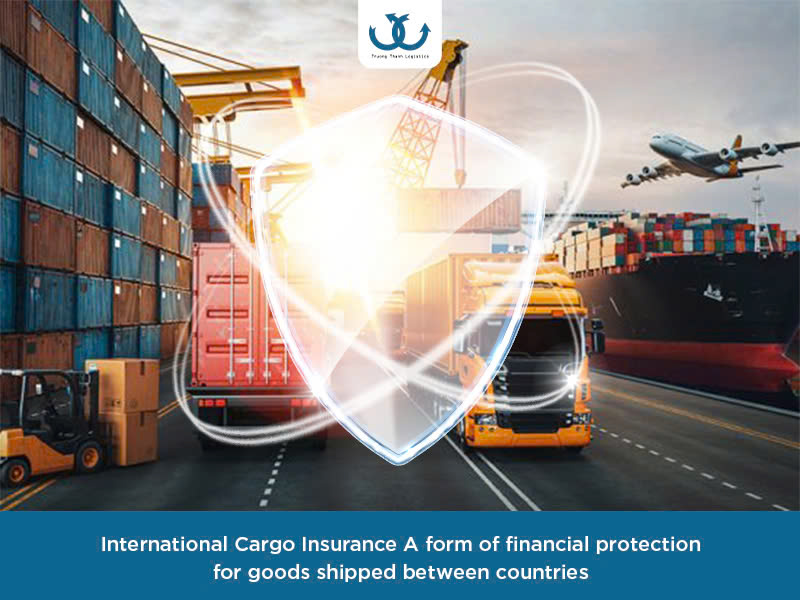
2. Why Should Businesses Purchase International Cargo Insurance?
In international trade, goods pass through multiple stages, modes, and transshipment points — each carrying potential risks that are difficult for businesses to control.
Even a minor incident — a storm at sea, a container falling overboard, handling impact, or theft at transshipment ports — can result in losses of hundreds of thousands of USD.
Therefore, purchasing international cargo insurance is a proactive and intelligent solution that helps businesses:
- Minimize financial losses
Maintain business credibility - Ensure cross-border shipments are always protected
Key Benefits of International Cargo Insurance
a. Financial Protection Against Transport Risks
Cargo insurance acts as a financial shield that compensates businesses when goods are damaged or lost due to:
- Natural disasters: storms, hurricanes, floods, lightning, earthquakes.
- Transport accidents: shipwrecks, collisions, explosions, overturning during transport.
- Theft or loss: especially during multi-port transshipment.
- Handling risks: drops, tilts, moisture, or damage due to poor storage conditions.
This helps businesses stabilize cash flow and sustain operations even in unforeseen circumstances.
b. Safety Assurance for Cross-Border Shipments
Different legal systems, infrastructure, and management processes across countries make risk control challenging.
Cargo insurance ensures peace of mind and integrity for:
- High-value goods: machinery, electronics, premium consumer goods.
- Fragile or perishable items: food, glassware, pharmaceuticals, refrigerated goods.
- Shipments with multiple transshipments or long sea routes.
When incidents occur, the insurer provides inspection, loss assessment, and prompt compensation — maintaining the continuity of your supply chain.
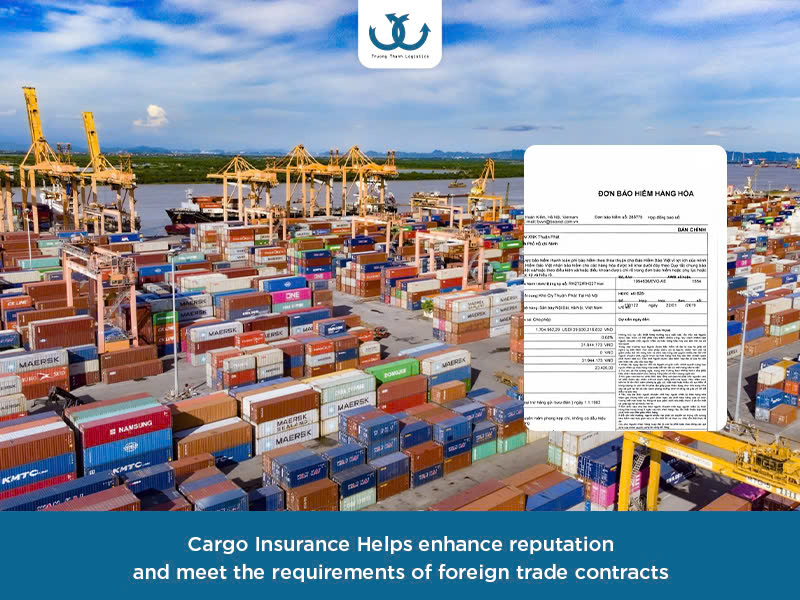
c. Enhancing Reputation and Professionalism in Global Trade
In international business, partners value companies with professional risk management practices.
By proactively purchasing cargo insurance, a business demonstrates that it:
- Has structured risk management awareness
- Respects and protects partner and customer interests
- Complies with international trade practices — building trust in foreign contracts
This creates a competitive advantage and long-term business credibility.
d. Compliance with International Trade Contracts
Many international contracts require insurance coverage under Incoterms conditions such as:
- CIF (Cost, Insurance, and Freight) – Price includes insurance and freight
- CIP (Carriage and Insurance Paid To) – Freight and insurance paid to the named destination
Under these terms, the seller must provide valid insurance.
Without it, the exporter risks breaching the contract or losing claim rights if an incident occurs.
Furthermore, the Insurance Certificate is an essential document in Letter of Credit (L/C) payments, facilitating smooth bank transactions.
e. Minimizing Legal and International Dispute Risks
Determining liability in loss cases is complex, especially when shipments involve multiple carriers or jurisdictions.
In such cases, the insurer acts as an independent third party to:
- Assess and determine objective causes
- Represent the insured during negotiation and claims
- Reduce trade disputes and legal costs
3. Common Types of International Cargo Insurance
Depending on the risk level and cargo value, businesses can choose from the following types:
| Type | Description | Coverage |
| Institute Cargo Clauses (A) – All Risks | Covers all risks during transport | Broadest coverage, including theft, collision, fire, natural disasters |
| Institute Cargo Clauses (B) – With Average (WA) | Covers major perils such as sinking, fire, heavy collision | Excludes minor or natural losses |
| Institute Cargo Clauses (C) – Free from Particular Average (FPA) | Basic coverage for total losses due to major incidents | Suitable for low-risk or short-distance shipments |
4. Process of Purchasing International Cargo Insurance
To ensure full protection and cost efficiency, businesses should follow these four essential steps:
Step 1: Provide Detailed Cargo Information
The insurer needs accurate details to assess risk and determine premiums, including:
- Cargo name, HS code, packaging type (carton, container, pallet, jumbo bag, etc.)
- Cargo value (based on invoice or CIF/CIP value)
- Mode and route of transport
- Ports of departure and arrival, expected schedule, Incoterms conditions
- Cargo condition (new, used, or with special storage requirements)
The more detailed the information, the more precise the risk assessment and quotation will be.
Step 2: Choose the Appropriate Insurance Type
Based on cargo characteristics and transport risks, select from:
- Clause A – All Risks
- Clause B – With Average
- Clause C – Free from Particular Average
Choosing the right coverage ensures cost optimization while maintaining sufficient protection.
Step 3: Sign the Policy and Pay the Premium
Once terms are agreed upon, the parties sign the Cargo Insurance Policy, which includes:
- Insured party details
- Cargo description and transport route
- Coverage type and scope
- Insured value (usually CIF value + 10%)
- Policy validity period
- Premium rate and payment method
Premiums are determined by cargo value, transport route, type of goods, coverage type, and risk history.
Step 4: Obtain the Insurance Certificate
After payment, the insurer issues an Insurance Certificate—a crucial document for foreign trade transactions, indicating:
- Insured party name
- Policy number and cargo declaration
- Transport route and carrier details
- Insured value and coverage scope
- Effective date and claim conditions
The Insurance Certificate serves to:
- Legally support compensation claims
- Act as a mandatory document in L/C transactions
- Assure banks and partners that the shipment is properly insured
5. International Cargo Insurance Claim Process
When damage or loss occurs:
- Notify the insurer or appointed surveyor within 3 days.
- Keep the scene intact for inspection.
- Provide necessary documents: Bill of Lading, Commercial Invoice, Insurance Certificate, Survey Report, and photos.
- Receive compensation after verification and loss assessment.
6. Trường Thành Logistics’ Role in International Cargo Insurance
In global trade, international cargo insurance is not just a contractual requirement — it is a financial shield protecting businesses from unforeseen losses.
At Trường Thành Logistics, supporting customers with insurance management is an essential part of our comprehensive supply chain protection strategy.
Advisory on Suitable Insurance Conditions
Every cargo type has specific characteristics — fragile, flammable, perishable, or high-value.
We analyze routes, transport modes, and potential risks to:
- Recommend the most suitable insurance clause (A/B/C)
- Guide clients in defining accurate coverage and insured values
- Ensure full claim protection when incidents occur
Assistance in Insurance Declaration and Documentation
We assist clients in preparing detailed cargo information, routes, and Incoterms for insurers, and help obtain the Insurance Certificate that aligns with L/C or partner requirements.

Coordination in Inspection and Claims Handling
When incidents happen, Trường Thành Logistics coordinates with independent surveyors, assists in completing claim files, and represents clients in working with insurers to accelerate compensation and stabilize cash flow.
Partnerships with Reputable Insurers
We collaborate with leading domestic and international insurance companies — such as Bảo Việt, PVI, AIG, and Chubb — to ensure:
- Transparent compensation
- Competitive premium rates
- Post-claim support and legal assistance
In international trade, safety equals profit.
International cargo insurance not only safeguards your goods but also strengthens your confidence in every cross-border transaction.
If you are looking for a reliable partner offering integrated insurance and logistics solutions, Trường Thành Logistics is your trusted choice — ensuring your cargo is safe, on time, and fully protected.
Trường Thành Logistics – Professional & Dedicated
Hotline: +84 915 36 38 39
Head Office: 5th Floor, Tower A, Song Da Building, Pham Hung Street, Tu Liem Ward, Hanoi, Vietnam.
Email: sale@truongthanhjsc.com
info@truongthanhlogistics.com
Website: https://truongthanhlogistics.com
HAI PHONG BRANCH
Address: Room C103, TTC Building, 630 Le Thanh Tong Street, Hai An Ward, Hai Phong City, Vietnam.
DA NANG BRANCH
Address: 126 Chau Thi Vinh Te Street, Ngu Hanh Son Ward, Da Nang City, Vietnam.
HO CHI MINH CITY BRANCH
Address: Room 41, 4th Floor, Casanova Building, 85 Nguyen Son Street, Phu Thanh Ward, Ho Chi Minh City, Vietnam




